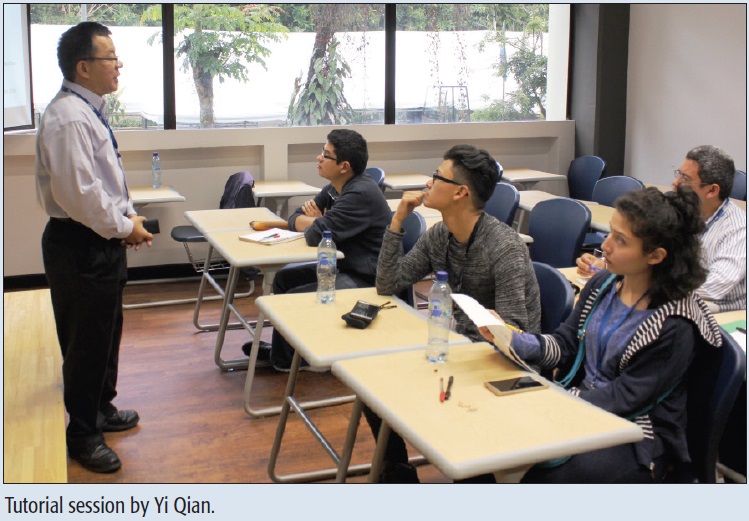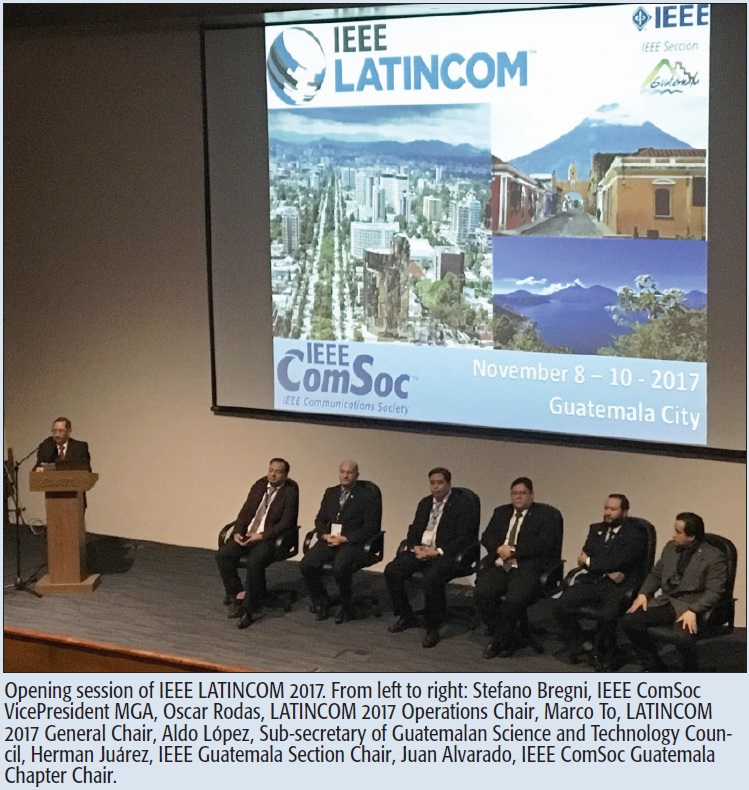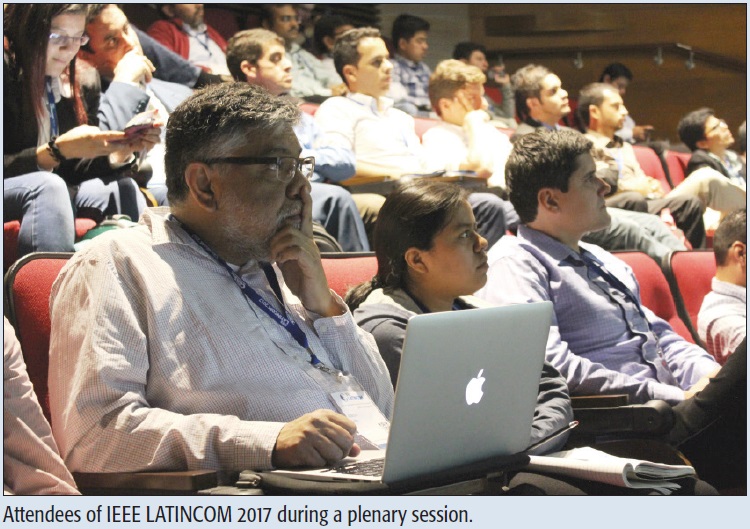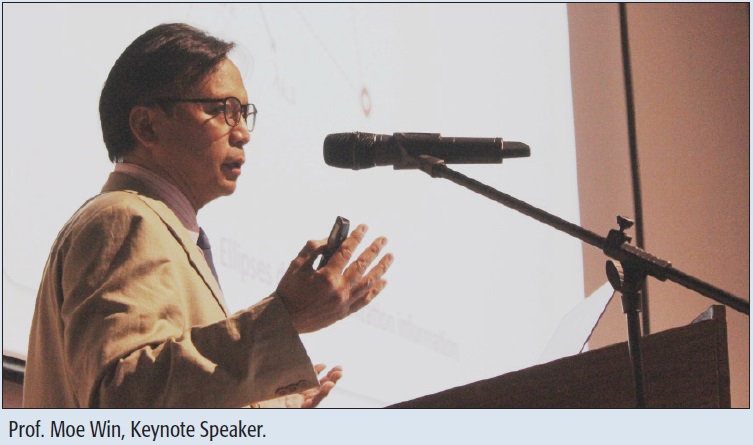
The 9th installment of the IEEE Latin-American Conference on Communications (LATINCOM 2017) was held in Guatemala City, Guatemala, living up to the original objectives, which were to become the flagship conference of the IEEE Communications Society in Region 9, and to attract worldwide renowned researchers, keynote speakers and industry. LATINCOM has now consolidated its place in Region 9 and the world because of these high standards.
Adding to the original objectives, the Organizing Committee (OC) had three basic goals for LATINCOM 2017:
- To promote the dissemination of research results in the area of information and communication technologies in Latin America and worldwide.
- To involve students, professionals, researchers and entrepreneurs in the subject of information and communication technologies.
- To encourage formal technology research activities in Guatemala.
After the conference, the OC believes that the objectives were fulfilled and exceeded their expectations, from the number of submissions to the number of international attendees, and created a very nice and rich knowledge exchange.
As with previous conferences, LATINCOM 2017 focused on the following topics:
- Networking
- Communication services
- Optical networks
- Communications systems and signal processing
- Wireless communications and networking
- Communications and energy efficiency
- QoS, reliability and performance modeling
- Enabling technologies.

LATICOM 2017 received 119 papers from around the globe. Submissions came from Europe, Asia and the Americas, including countries such as Russia, Japan, Taiwan, France, Switzerland, Italy, USA, Brazil, Chile, and México, among others. From these, 45 papers were accepted. Also, some borderline papers were given the opportunity to present in the conference for feedback from the conference attendees.
LATINCOM 2017 also had an International Technical Program Committee, led by TPC CoChairs Rose Hu from Utah State University, USA, and Luiz Bittencourt from the University of Campinas, Brazil. Both did an outstanding job in following IEEE and ComSoc regulations for international conferences.

Guatemala is becoming a technology hub, where a large number of companies, both national and foreign, are consolidating in the country. In addition to this, universities must keep abreast of the latest developments in the field of communication technologies, where the local offer is extremely scarce of non-commercial events oriented to formal research, making LATINCOM one of the first of its kind to be held in Guatemala. Furthermore, the participation and collaboration of local universities, such as the Universidad Galileo, which hosted the first day of the conference, attracted numerous students and provided great experiences for the young generation. The Convention Center of the Westin Camino Real hosted the remaining two days of the conference.
World renowned keynote speakers and tutorial lecturers took part in the program, some as part of the IEEE Distinguished Visitors Program (DVP). Prof. Luiz DaSilva, IEEE ComSoc Distinguished Lecturer and Chair of Telecommunications at Trinity College Dublin, Ireland, spoke on the topic “Sharing Infrastructure and Spectrum: A Vision for the Future of Mobile Networks.” Prof. Moe Win, founding director of the Wireless Communication and Network Sciences Laboratory of the Massachusetts Institute of Technology (MIT), USA, spoke on the topic “Network Localization and Navigation: A New Opportunity in Statistical Communication Theory.” Prof. Hikmet Sari, Chief Scientist at Sequans Communications, and professor at Nanjing University, China, spoke on the topic “Multiple Access for 5G: Challenges Ahead.” Pramode Verma, Professor Emeritus of Electrical and Computer Engineering at the Gallogly College of Engineering of the University of Oklahoma, USA, spoke on the the topic “Unconditional Security through Quantum Uncertainty.”

In addition to those mentioned, three high quality tutorials were presented. Prof. Yi Quan, Department of Electrical and Computer Engineering, University of Nebraska-Lincoln, USA, spoke on the topic “Security for 5G Wireless Communication Systems: Recent Development and Challenges.” Prof. Carlos Gutiérrez, Faculty of Science, Universidad Autónoma de San Luis Potosí, México, spoke on the topic “Modeling, Analysis, and Simulation of Multipath Radio Channels for Vehicular Communications.” Prof. Pramode Verma spoke on the topic “Network Science: An Introduction”.
Parallel sessions were presented during the last two days of the conference, where accepted papers were presented in three conference rooms. Session chairs promoted discussions among attendees and authors, creating valuable feedback for future research.
On Thursday evening, LATINCOM hosted its Gala Dinner, including the Best Paper Award Ceremony. Two honorable mentions were given, first to Juan Montoya and Natalia Gaviria for their work on “Optimal RAT Selection and WiFi Offloading in Multi RAT HetNet with User Centric Deployments.” The Second honorable mention went to Gourab Maiti, Ravi Shankar B, Naresh Kumar T, Pradeep Goutam, S V Hari Prasad, and Soundarakumar M., for their work on “Variable Fractional Rate Digital Down Converter for Satellite Communication.” Finally, the best paper award went to Bryan Teague, Zhenyu Liu, Florian Meyer, and Moe Z. Win for their outstanding work on “Peregrine: 3-D Network Localization and Navigation.”
The Gala Dinner also recognized the Organizing Committee and its General Chair, Dr. Marco Antonio To, for successfully organizing the first LATINCOM in the northern part of Region 9 and also the first time in Central America. The success was a combination of hard work by the OC and the Steering Committee, and the support of various patrons, especially the National Guatemalan Council for Science and Technology (SENACYT). This event showed that academia, industry and government working together are able to promote the development of technology research in the country and the region.
LATINCOM 2017 concluded on Friday, November 10, after providing a good networking environment and shared experiences by the attendees.